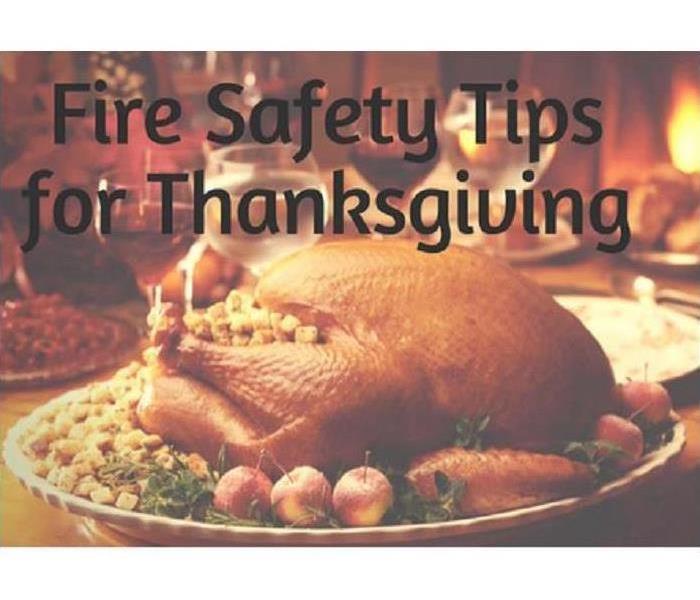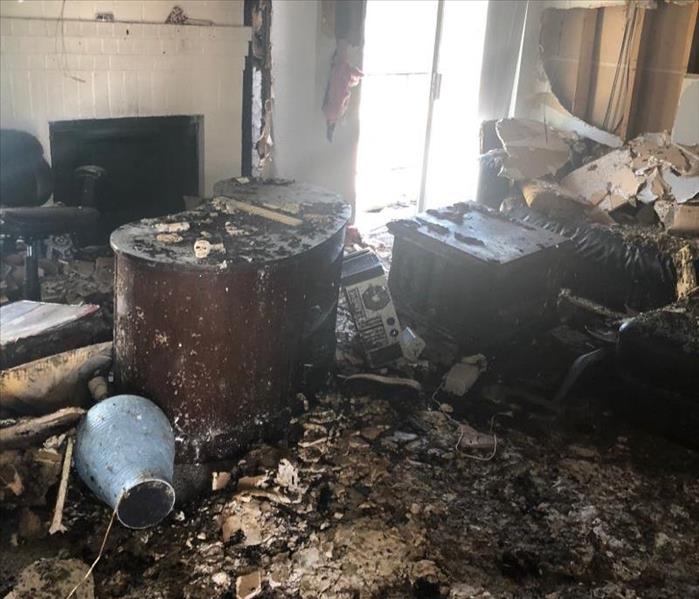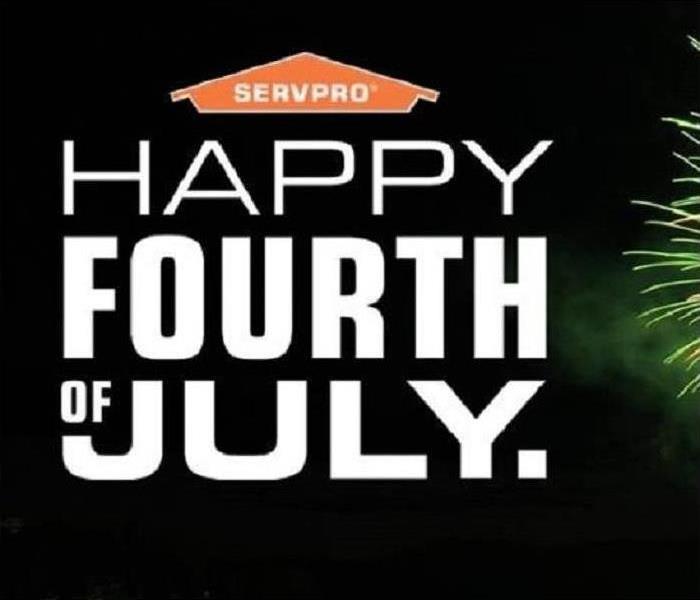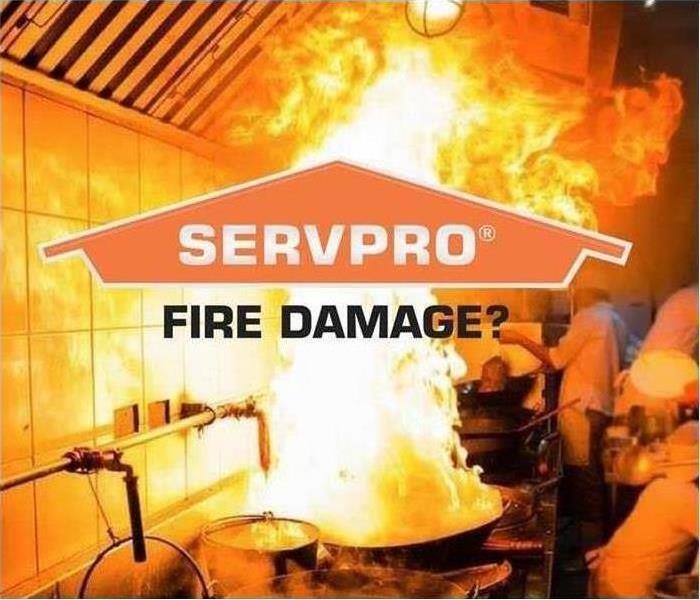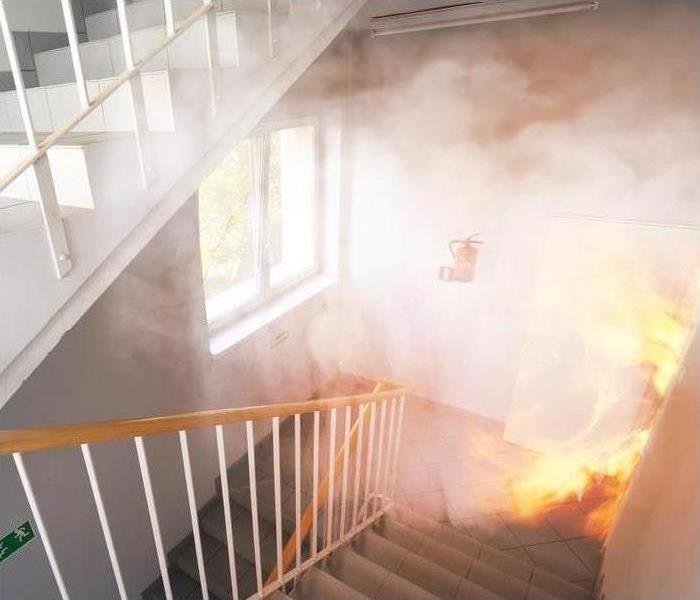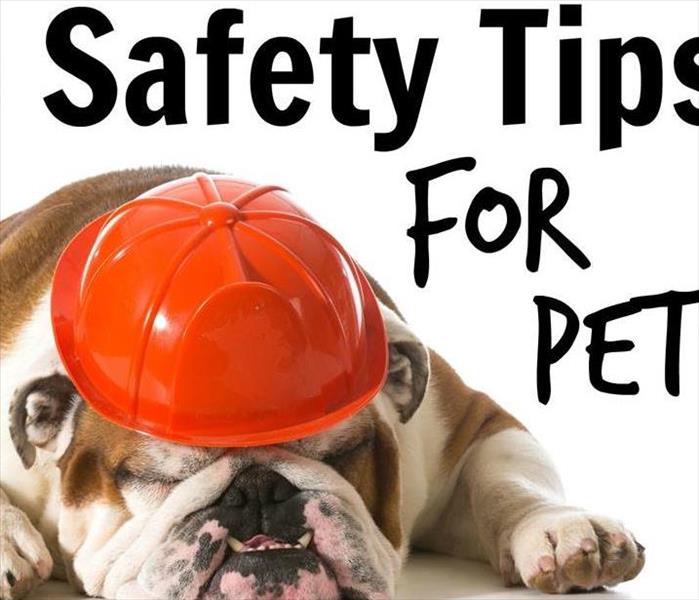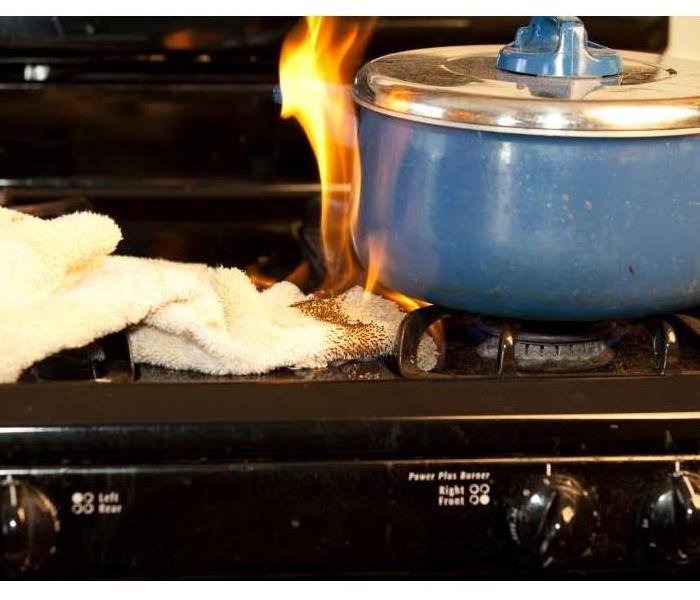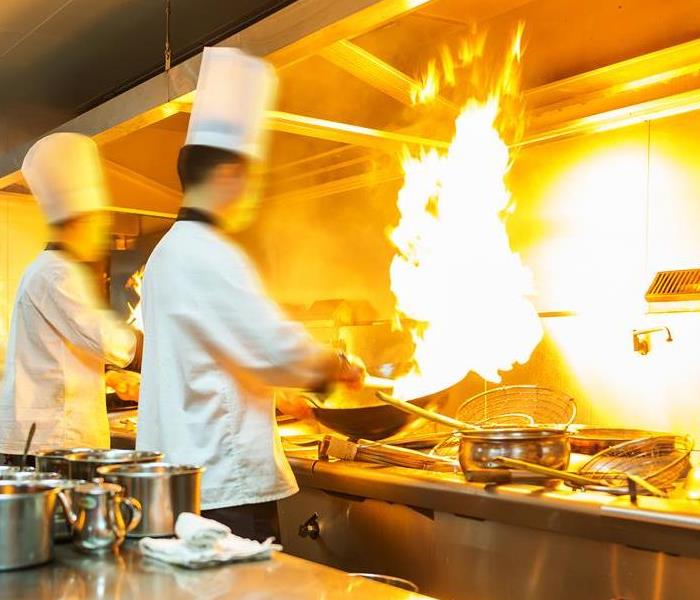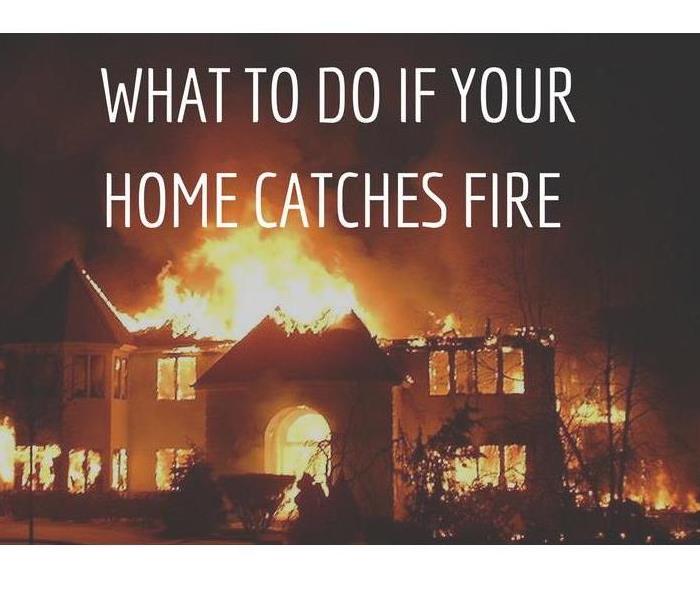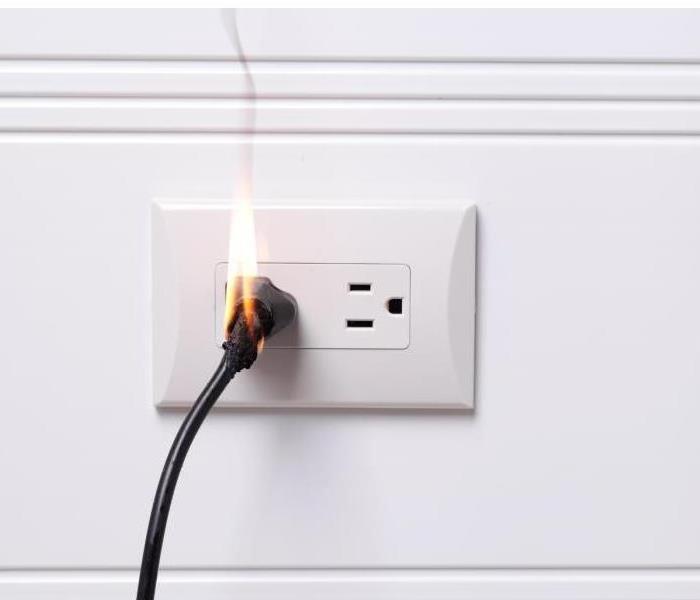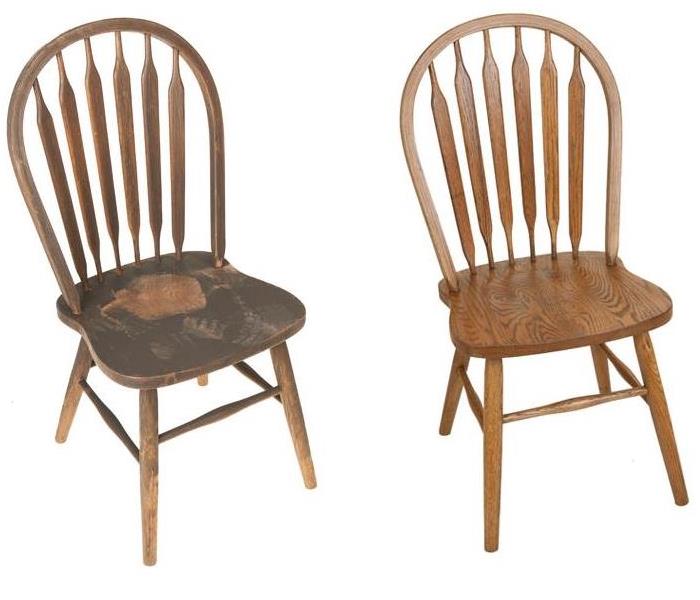Archived Fire Damage Blog Posts
Fall Cleaning and Fire Protection
9/19/2023 (Permalink)
Fall is a great time to get your home in order. While you’re in the process of fall cleaning, you can also focus on small things that can help you reduce accidental fires in your home. Fires can occur when you least expect them, but you can prevent them by following some simple guidelines as you do your fall cleaning:
Fall Cleaning Fire Safety Checklist:
- Smoke and Carbon Monoxide Alarms - Replace smoke and Carbon Monoxide alarm batteries and check them once a month by pressing the test button. Gently clean the alarms and make sure you are following the manufacturer's instructions.
- Kitchen - Keep countertops and stovetops free from grease and clutter. Excess grease and or dirt on the drip pan or stovetop can easily catch fire. Make sure you clean oil and food spills immediately after they happen and wait until the stove is cool and wipe away the oil or food spills. Keep items that could catch fire, such as oven mitts, towels, or wooden utensils away from your stovetop.
- Electrical Cords - Inspect the electrical cords in your home and replace worn or tattered cords. Don’t run cords under carpets or across doorways. This will prevent them from being damaged. Use extension cords only temporarily and plug-in major appliances directly into wall sockets.
- Clothes Dryers - Excess lint in the dryer is the number one cause of clothes dryer fires. Clean the lint that has been collected around the drum before or after each load of laundry. Always use a lint filter and clean it regularly. Move combustible items such as boxes, clothing, and boxes away from your dryer to a safer area.
- Grilling - Clean the grease or fat build-up after every use. Doing this not only reduces the risk of fire but also helps the food cook better. Check the propane tank, hose, and all connection points for leaks. If you smell gas when the grill is on, turn off the tank and the burners immediately.
- Escape Plan - You should protect your family with an escape plan in the event of a fire or other disaster. The plan should include a map of each home level with two escape routes in each room. Discuss and practice the plan with everyone in your household, including children, and pets in the plan.
While fall cleaning helps you get your house in order, it's also wise to concentrate on jobs that enhance your home's security. Fires can happen when you least anticipate them, but you can help prevent them by following these safety tips to your fall cleaning routine.
With our 24/7 emergency response and highly trained technicians, SERVPRO® of Spring / Tomball is your go-to partner when disaster strikes. We understand the urgency of water and fire damage, and we're committed to helping our community recover quickly.
Avoiding Fire Losses in your Home
1/27/2022 (Permalink)
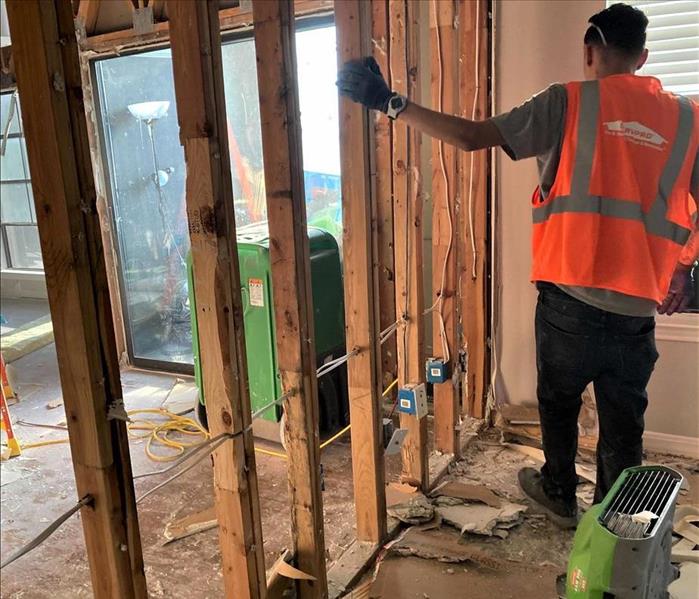 SERVPRO of Spring/ Tomball
SERVPRO of Spring/ Tomball
Experiencing a fire loss at your home or business can be very difficult. Anything that endangers your home, business, or family life is something most people can’t imagine or find hard to understand.
Fortunately, some of the most common causes of fires within your home can be avoided by taking simple measures to avoid having to go through an experience like this that can be so devastating.
Here are some of the main issues you need to watch out for and how you can prevent them:
- Cooking
- Heating
- Electrical
- Smoking
- Candles
Cooking in the kitchen causes about half of the fires within a home. Once a grease fire begins, it’s very hard to stop the spread without hurting yourself or others. Don’t walk away from food especially when using grease or oil. It’s important to turn off the source of heat and know where your fire extinguisher is. Any portable appliances like toasters will need to be cooled before returning them to their cabinets.
Issues with heating in the home mostly come from portable methods, such as space heaters. Make sure you read all the instructions included and you know how to use the controls. It will be important to move any curtains or other flammable fabrics away from these types of items and never leave the house with them running.
Electrical problems can occur for numerous reasons. Have a professional electrician come over to check wiring in your home and make sure that it isn’t outdated or damaged in any way. This can also occur during a new appliance installation, storm, or power outages. Only plug in the recommended number of wires into a single socket and keep loose wires organized. Any electrical problems need to be dealt with promptly by a licensed professional.
Smoking is not something you want to do within your home. Cigarettes can cause damage in more ways than one, but the most common theme is the residual slow burn of the end of the cigarette that isn’t fully put out. Always make sure that your fire alarms are up to date, fully functional, and the batteries are tested. Any flammable materials or textiles can go up in flames in a matter of minutes.
Candles left unattended can be a huge risk for your home and family. Remember to always put candles out before you leave. Make sure to keep candles high out of the reach of children or pets who may knock them over and far away from any flammable materials in your home.
In any of these situations, you need to call a professional who can walk you through their experience. This is not something that you need to handle on your own. Our team here at SERVPRO of Spring/ Tomball is here to help with any questions or concerns you might have.
House Fires in Houston, TX
12/3/2021 (Permalink)
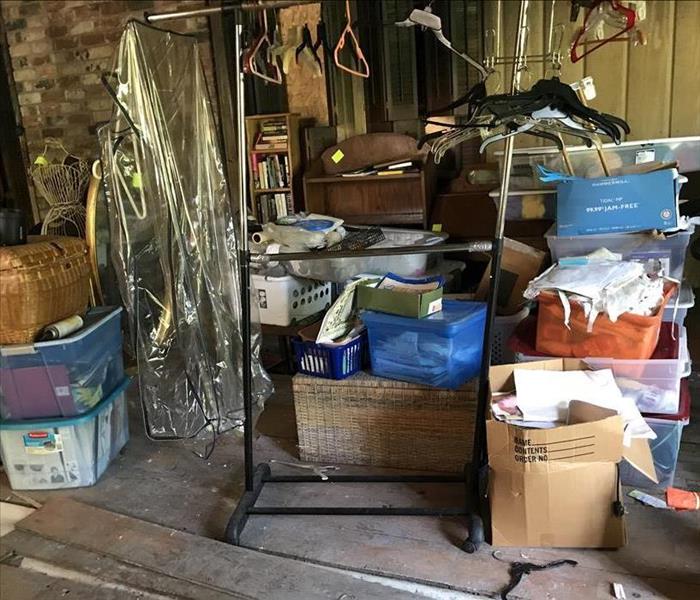 SERVPRO of Spring/ Tomball
SERVPRO of Spring/ Tomball
Dealing with the aftermath of a house fire in Houston can be extremely stressful especially when soot has completely covered your belongings. It should be known that fire damage cleanup is one of the most difficult aspects of a house fire.
In the event of a fire in your home, be sure to call your local Houston fire department first. Your focus should always be safety first. Once you and your family are safe and secure reach out to your insurance agent to see if an insurance claim is necessary.
This is when you call us at SERVPRO of Spring/ Tomball. Your family is safe, your insurance has been reviewed, and now you need a fire restoration company.
Soot can develop through three different methods:
- Wet soot residue results from smoldering, low-heat fires. This residue is sticky, smeary, and has a very pungent odor.
- Dry soot residue results from fast-burning fires with high temperatures. This residue is typically dry, powdery, and non-smeary.
- Protein residue is almost invisible but can discolor paints and varnishes in your home. This residue also has an extremely pungent odor.
Each type of smoke damage restoration is different and requires specific expertise to clean. You need a fire restoration company, our team here at SERVPRO of Spring/ Tomball. We are highly trained in smoke, fire and water cleanup and restoration and can assist in all aspects. We consider everything we need to clean and what our plan is moving forward.
Structural Cleaning - After a smoke or fire damage, ceilings, walls, woodwork, carpeting and floors will often need a thorough cleaning. Our team will walk your property to determine the extent of damage. We will use specific equipment and cleaning products for the different types of surfaces and products found within your structure.
Depending on the amount of soot, we can lower the cost of cleaning if lighter soot deposits are found. We can also see if the expense can be lower with repainting or refinishing. If this is not the case, we will clean to prepare for painting. This process deodorizes and ensures the new paint will adhere properly to the surface.
Contents Cleaning - All the restorable contents in affected areas will be professionally cleaned and deodorized. This includes area rugs, furniture, draperies and upholstery. Our team will begin by carefully inspecting and testing all fabrics to determine which cleaning methods are most appropriate.
Both wet and dry-cleaning services can be provided as we deodorize and restore contents to preloss condition. This process would include electronics, art, wood furniture, kitchen items, clothing, bedding and much more. Finally, we can provide an inventory list of all "to be claimed" items if so requested.
Deodorization – We provides specialized services that rid your home or place of business of offensive odors left by fire or smoke damage. We do not cover up lingering odors with a fragrance. As we seek out the sources of the odor and remove them. Ask us to explain the various methods available and which will work best for you.
No matter how difficult or hard you find your situation to be, we can help. Find your fire restoration team at SERVPRO of Spring/ Tomball to help restore your home and bring it back to pre-damage conditions.
What Is the Job of a Fire Damage Restoration Company?
12/3/2021 (Permalink)
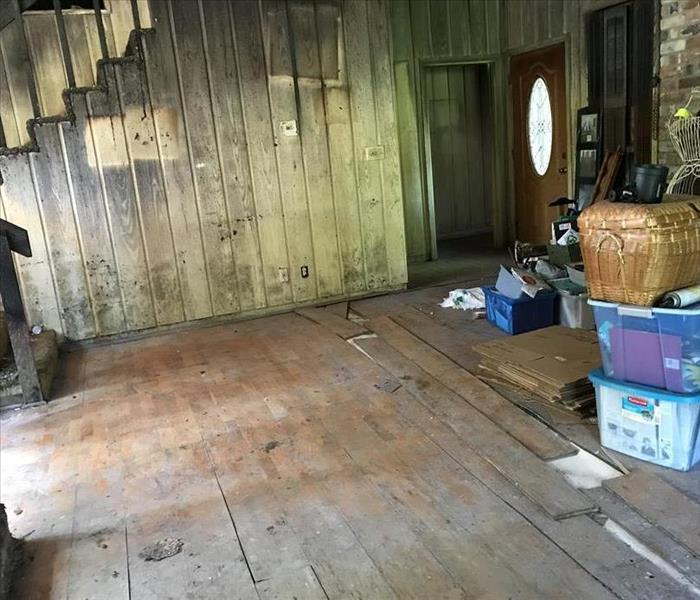 SERVPRO of Spring/ Tomball
SERVPRO of Spring/ Tomball
SERVPRO of Spring/ Tomball are some of the first responders when a home has been damaged by fire or floods, excessive water damage, or other major catastrophes. The ultimate job of a restoration company is to clean up the damage, remove it from the property and to preserve and protect the home so that it and the contents within it don't suffer from further damage.
Some restoration companies also will be able to repair your home or business to bring it back to its original condition. When hiring a water damage restoration company, you'll want to ensure you have a clear understanding and what they will and will not do at your property.
Your Insurance & the Restoration Company
After your property has suffered a major event and subsequent damage, you'll want to contact your insurance agent. Be sure to review your responsibilities with your insurance agent, and what is required by your insurance policy for cleaning up the home to prevent any additional damage. You'll want to discuss any questions you may have with your insurance agent.
Your agent may make referrals of restoration companies within the area. You can also contact a fire restoration company on your own.
When choosing a fire damage restoration company, be sure they have all the proper certifications, are fully licensed and have at least a few years of experience in the water damage restoration industry. Make sure you're working with a company you can trust; your property is in their hands after all.
One of the benefits of working with SERVPRO is the national reputation our company has built and continues to uphold. SERVPRO franchises and employees are all upheld to strict training guidelines.
The Process Once the Fire Damage Restoration Company Arrives
Do a walkthrough of the property with our team. Point out and discuss all the areas that need to be cleaned. We may be able to identify issues that you're not aware of, so you should also allow them to thoroughly examine the issues.
We will be evaluating what will be needed in terms of time, work and equipment to clean and restore your home. You should expect that they'll provide you with an estimate for those services.
Though insurance companies will cover most of the work done by damage restoration companies, there can be instances where not all cleaning and restoration services will be covered. You'll want to make sure you understand from your insurance company what will and won't be covered.
When they provide you with a contract, as with any contract you should read over it thoroughly and ensure that you understand the services listed and what will be done on your property. Be sure to request that you receive documentation showing the drying process and completion.
Once the work has been completed, be sure to keep a close eye on the areas where the restoration work was done, as you'll want to make sure no moisture or dampness from the water damage remain in your home.
Some Things to Look Out for When Choosing a Restoration Company
Reputable restoration companies will be IICRC certified. IICRC stands for the Institute of Inspection, Cleaning and Restoration Certification. It's a non-profit organization that offers certification programs and standards for the restoration industry.
In order to be IICRC certified, the restoration company must have proof of insurance, maintain a written customer complaint policy with follow-up on complaints, and provide the technicians with education and training to become certified.
Companies may also be members of the Restoration Industry Association (RIA). The RIA is a trade association for cleaning and restoration professionals. In addition to education and training, the trade association offers technical support and several certifications for technicians.
Here's a quick review of how to proceed when water damage strikes your home or business:
1. Be sure to choose a restoration company with an excellent reputation that have been around for at least a few years.
2. Check that your restoration company is IICRC Certified
3. Read the contract carefully and be sure to keep your own copy
4. If a problem occurs, make sure you contact your restoration company right away
5. Check with your insurance company on what is expected of you following a major loss.
6. For any insurance coverage questions, be sure you get answers in writing from your insurance company claims adjuster.
7. Remember that it's important to act fast to prevent further damage from water or flooding. This is to prevent things like mold from growing. Delays can end up costing you much more in the end in terms of recovery, salvage, and reconstruction.
8. Make sure repairs to your home are done promptly after the cleanup service occurs.
We understand how devastating a damage event can be. When you need to ensure your property is in good hands, be sure to contact our SERVPRO of Spring/ Tomball
team. We don't just clean up and remove the damage, we specialize in restoring your property to its original condition and making it "Like it never even happened."
SERVPRO Spring/ Tomball Emergency Fire and Water Damage
7/25/2021 (Permalink)
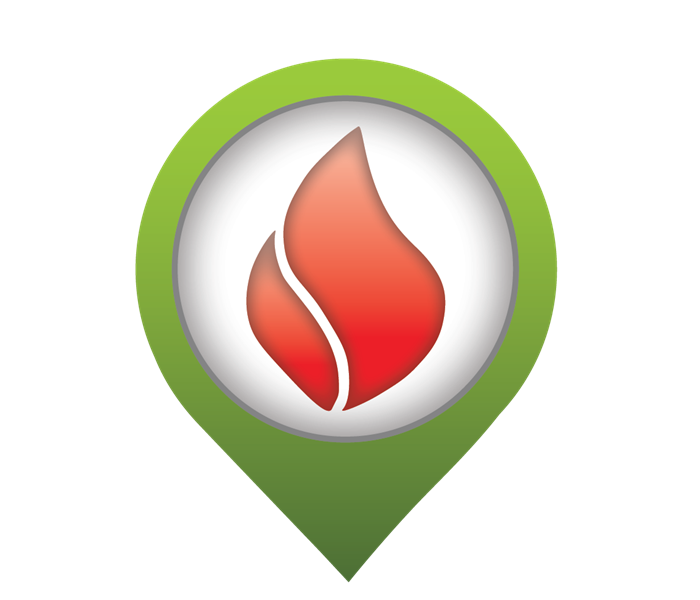 SERVPRO of Spring/ Tomball
SERVPRO of Spring/ Tomball
Dealing with the aftermath of emergency fire damage restoration can be extremely stressful especially when soot has made its way through your house and completely covered all of your belongings.
SERVPRO of Spring/ Tomball is trained and licensed to give you an optimal experience as we care for your residential or commercial property as your SERVPRO of Houston, independently owned and operated location. It should be known that soot restoration is one of the most difficult aspects of a house fire as it can be very damaging.
According to the National Fire Protection Agency (NFPA), three of every five home fire deaths could have been prevented.
Most fatal fires happen when families are asleep giving them less than adequate time to escape. A smoke alarm stands guard around the clock, and when it first senses smoke, it sounds a shrill alarm. Smoke alarms are crucial elements in the early detection of fires.
National Fire Safety is important all year round and while the main focus is preventing residential fires, our team here at SERVPRO of Spring/ Tomball would like to remind everyone this is a great time to revisit workplace fire prevention and safety.
Below are 12 tips to ensure a fire-safe workplace:
Step 1. Get Organized– Practice good workplace housekeeping. Clutter contributes to fires by providing fuel and by preventing access to exits and emergency equipment.
Step 2. Designated Smoking Areas – Smoke only in designated areas, and extinguish smoking materials safely. Never smoke in storerooms or chemical storage areas.
Step 3. Fire Extinguishers – Maintaining the appropriate type and number of fire extinguishers and learn how to properly use a fire extinguisher.
Step 4. Electrical Hazards – Report all electrical hazards. Many fires start in faulty wiring and malfunctioning electrical equipment.
Step 5. Access to Control Panels – Electrical control panels need to have free access maintained so that the electric could be shut off easily.
Step 6. Maintenance – Maintain machinery to prevent overheating and friction sparks.
Step 7. Sprinkler Systems & Smoke Detectors – Never block sprinklers, firefighting equipment or emergency exits. Observe clearances when stacking materials. Testing of sprinkler systems and smoke detectors at least annually.
Step 8. Chemical Safety – Use and store chemicals safely. Read the label and the Material Safety Data Sheet to determine flammability and other fire hazards. Provide adequate ventilation when using and storing these substances.
Step 9. Waste Control & Storage – Control the accumulations of flammable and combustible waste materials and residues so that they do not contribute to a fire emergency.
Step 10. Prevent Ignition – Use all precautions to prevent ignition in potentially explosive atmospheres such as those containing flammable liquid vapors or fine particles. Use non-sparking tools, and control static electricity as required.
Step 11. Exits – Emergency exit diagrams should be posted and emergency exits should be well lit with neon-regulation signs.
Step 12. Contact Info – Employees should have a list of emergency contact phone numbers in case of emergency. Remember that people will often panic in an intense situation; therefore basics such as the company address, phone number and floor plan should be posted.
Planning to ensure fire protection and safety is key to avoiding unwanted fire issues.
Residential and Commercial Fire Clean Up
Soot can be one of the hardest parts of fire restoration clean up and is developed through three different methods:
· Wet soot residue—results from smoldering, low-heat fires. This residue is sticky, smeary, and has a very pungent odor.
· Dry soot residue—results from fast-burning fires with high temperatures. This residue is typically dry, powdery, and non-smeary.
· Protein residue—almost invisible but can discolor paints and varnishes in your home. This residue also has an extremely pungent odor.
Each type of soot is different and requires specific expertise to clean for such needs or concerns.
Our fire repair process is outlined online for your review.
Call us at SERVPRO of Spring/ Tomball, your SERVPRO of Texas, faster to any size disaster, for all your fire and restoration needs.
When Should You Replace Your Smoke Alarms?
1/26/2021 (Permalink)
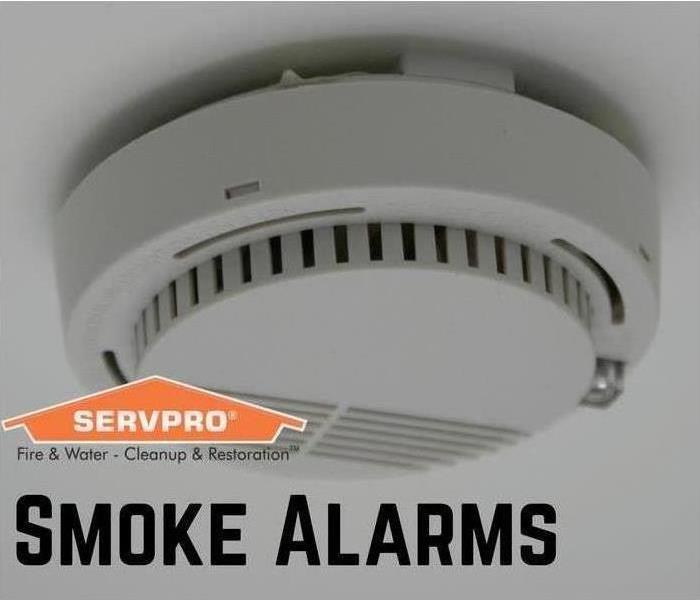 Call SERVPRO of Spring/Tomball 24/7, 365 at (281) 374-6454. We are always here to help!
Call SERVPRO of Spring/Tomball 24/7, 365 at (281) 374-6454. We are always here to help!
3 Signs You Need to Replace Your Smoke Alarms
Having properly functioning smoke alarms in your Houston, TX home is an essential aspect of basic fire safety. These devices give you the first warning that your home is in danger in the event of a real fire. After you’ve had your fire alarm system for a while, though, it may stop working as effectively as it once did. If you notice any of the following signs, it may be time to replace the smoke alarms in your home.
1. The Alarms Are Over 10 Years Old
Like all other devices, your smoke detectors will eventually reach the point where they’re too old to work properly. To see if this is the case, simply check the date of manufacture on the back of the alarm. If at least 10 years have passed since the printed date, you’re due for a new alarm system.
2. The Alarms Fail the Monthly Test
To ensure that your fire alarm system is in top condition, you should test it at least once a month. Find the test button on the front or side of each device and hold it down for a few seconds. If the alarm doesn’t emit any sound, this is a likely indicator that the system needs to be replaced.
3. The Alarms Go Off Randomly
Your smoke detectors must do their job of alerting you of a real fire emergency before any fire or smoke damage ensues. However, if your alarms frequently go off for no apparent reason, they could be defective. To save yourself the constant noise and properly safeguard your home from danger, be sure to have new detectors installed as soon as possible.
Unfortunately, your fire alarm system may fail you unexpectedly. If you experience any signs of smoke or fire damage in your Houston, TX, home, trust fire restoration professionals to bring it back to its normal state.
Fire Damage Tips in Houston, TX
11/19/2020 (Permalink)
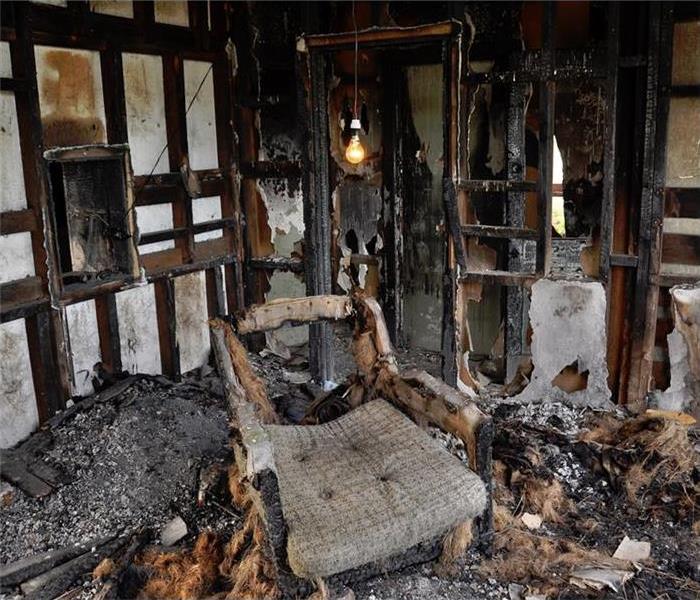 SERVPRO of Spring/Tomball is here to help 24/7. Call us at (281)374-6454.
SERVPRO of Spring/Tomball is here to help 24/7. Call us at (281)374-6454.
When damage from a fire occurs at your home or business in Houston, TX and surrounding areas, it can be difficult to know what steps to take next. You may feel fearful or hopeless as you walk through the space that used to be your safe haven. SERVPRO of Spring/Tomball has Fire Damage Emergency Tips that can be of assistance when you aren’t sure what to do:
- Limit movement in home to prevent soot particles from being embedded into upholstery and carpets.
- If electricity is off, empty freezer and refrigerator and prop doors open to avoid microbial growth.
- Keep your hands clean so as not to further soil upholstery, walls, and woodwork.
SERVPRO of Spring/Tomball is here to help with 24/7 emergency service and timely mitigation response to help alleviate your concerns. We will work diligently to restore your home and memories back to their original beauty.
Space Heater Safety
11/9/2020 (Permalink)
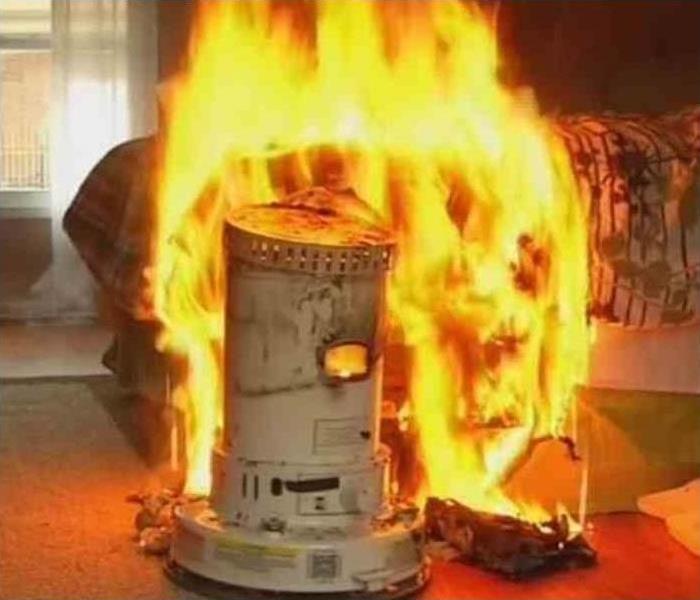 SERVPRO of Spring/Tomball is always here to help. Call us 24/7 at (281) 374-6454.
SERVPRO of Spring/Tomball is always here to help. Call us 24/7 at (281) 374-6454.
While space heaters can help save you money on your energy bills, there are a few things you need to keep in mind when deciding to go this route.
- Buy a space heater that is rated for your need. A heater that is too large for a certain area can lead to higher energy bills due to it consuming a lot of energy. On the other hand, if you buy one that is rated too small for your space, it will have to work harder to heat the space.
- It's suggested that you place your space heater at least three feet away from furniture, window treatments, bedding, clothing, rugs, and other combustibles. There is a chance a fire can start if these items touch the heating element of the space heater. Also, make sure to place the space heater on a hard level surface so there is less chance of it tipping over.
- Make sure the heater you purchase carries a label from either UL, ETL, or CSA. These are safety consulting and certification companies.
- It is a good idea to purchase a space heater that has tip-over and overheat protection. A heater that has tip-over protection will automatically shut off if it tips over for any reason. Overheat protection is when the space heater uses a temperature sensor to detect unsafe temperatures. When this happens, an internal switch will automatically shut off the unit.
- Plug the space heater directly into an outlet instead of an extension cord. There is an increased risk of fires if plugged into an extension cord.
- Frequently clean and maintain it to ensure it's working safely. Wiping it down is also important as this helps reduce the amount of dust and allergens that can spread.
- Turn off and unplug the space heater if not in use to reduce the chance of a fire occurring.
- Last, but not least, keep heaters away from water such as in a bathroom or a damp basement.
Getting Rid of Odors After A Fire Damage Can Be Difficult!
8/26/2020 (Permalink)
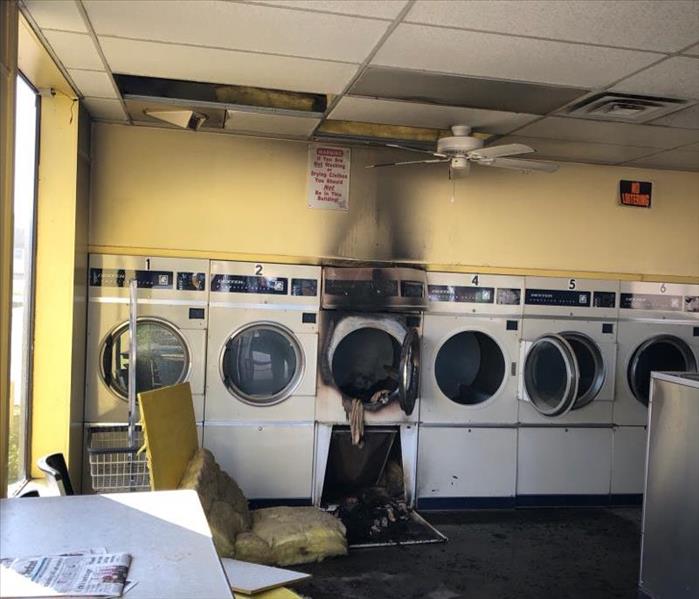 If you have fire damage to your residential or commercial property, call SERVPRO of Spring/Tomball at (281) 374-6454, we are always here to help.
If you have fire damage to your residential or commercial property, call SERVPRO of Spring/Tomball at (281) 374-6454, we are always here to help.
For Fire Damage Restoration and Deodorization of Your Houston, TX Home, Call SERVPRO of Spring/Tomball.
Odors are volatile molecules that people's noses sense when they are present in the air. Since fragrances can easily evaporate, they eventually go away or dissipate once the source gets removed; however, the removal process can take a long time.
What can cause smoke odors to exist?
During fire damage projects in Houston, foul aromas usually get caused by burnt materials or soot residues that are present after the blaze gets extinguished. The first step our SERVPRO technicians take during the restoration process is to remove all charred items and clean any surfaces that contain soils and soot residues. Once we capture all soils, residues, and burnt materials, we dispose of them in sealed plastic bags, so other previously unaffected areas of your home do not get contaminated.
What do you do if unpleasant smells still exist after all soot residues have been cleaned and burnt materials have been removed?
In some situations, foul aromas can still be present after soot is removed and debris has been disposed of because the smoke can penetrate porous materials deeply. When this occurs, we can use the following products and equipment to deodorize your house:
Odor Counteracting Beads- These are made of a special treated porous material that, as soon as the bag is opened, deodorant molecules get released into the air.
Deodorant Granules or Pellets- These specialized pellets or granules are odor absorbent that act as a sponge and hold in odors.
Water-Based Odor Counteract-ants- Specialized chemicals can be added to cleaning solutions that can help counteract malodor particles.
Ultra-Low Volume (ULV) Misters- ULV fog machines break down water-based deodorants into a mist so the chemicals can penetrate porous materials.
Thermal Fog Machines- Thermal machines break oil-based deodorants down even smaller so it can travel through your structure in the same way smoke did.
Sealers- Specialized sealant paints can trap in malodor molecules.
If you ever smell smoke in your home after you have a fire in Houston, TX and surrounding areas, call SERVPRO of Spring/Tomball at (281) 374-6454.
Fire Tips To Keep Your Family Safe
8/12/2020 (Permalink)
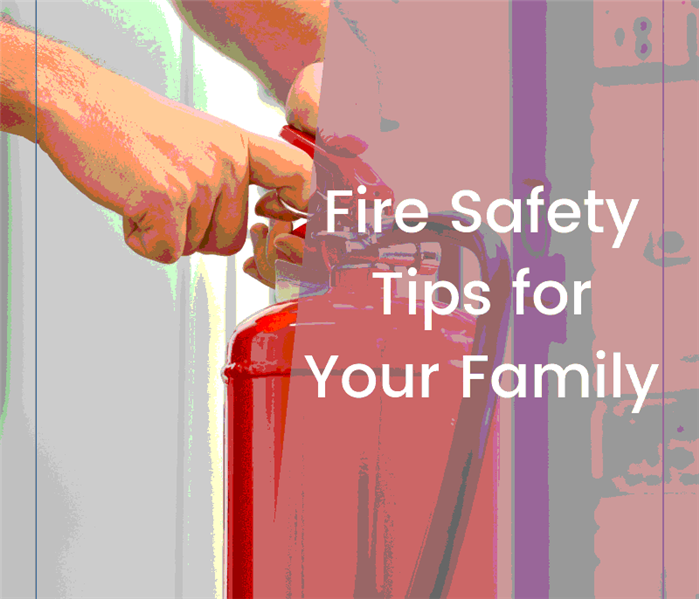 If you have fire damage to your Houston, TX home, call SERVPRO of Spring/Tomball at (281) 374-6454.
If you have fire damage to your Houston, TX home, call SERVPRO of Spring/Tomball at (281) 374-6454.
According to the American Burn Association, children are the most susceptible to burn injuries. 73% of all burn injuries happen in the home. At some point in time, children are going to be curious about fire, but it can be dangerous and costly.
Here are some tips to follow to keep your family safe according to the National Protection Association:
- Be sure to keep all matches and lighters out of the reach of children, preferably somewhere up high or in a locked cabinet.
- Closely supervise your children, making sure that they are away from any fire sources, including lit candles, cigarettes, fire pits, and stoves.
- Take advantage of any opportunity to teach your children about fire safety.
- Explain that fires are something to be taken seriously as they move very fast and can hurt you with contact.
- Teach young children to not touch matches or lighters, and to notify an adult immediately if found.
- Establish a clear set of rules and consequences about unsupervised and unapproved uses of fire.
- Remember, children are always watching. Make sure you set a good example by handling fire in a safe manner.
- Show your children appreciation for displaying respect and age-appropriate responsibility when it comes to fire.
If your children happen to burn themselves, cool the burn by running it under cold water for 10 to 15 minutes.
If it is a more serious burn, CALL 9-1-1.
Do You Have an Escape Plane
6/29/2020 (Permalink)
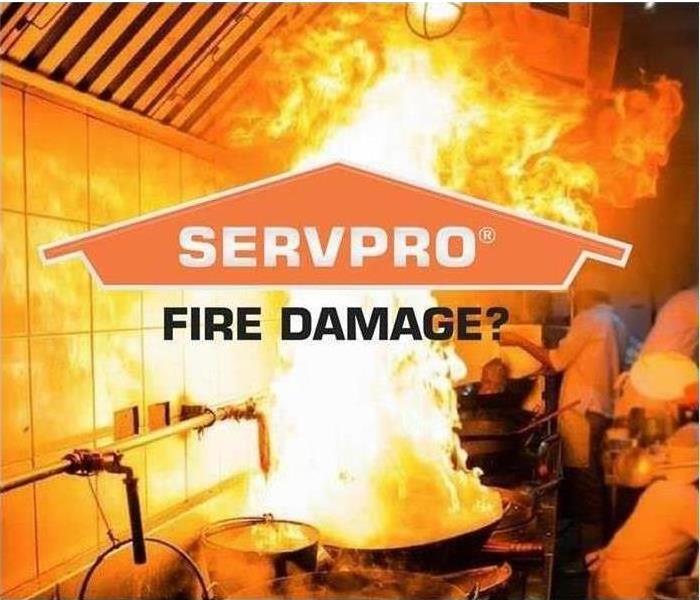 SERVPRO of Spring/Tomball is here to help 24/7, 365 days a year. Give us a call at (281) 374-6454 if you have fire damage to your home or business.
SERVPRO of Spring/Tomball is here to help 24/7, 365 days a year. Give us a call at (281) 374-6454 if you have fire damage to your home or business.
Fire Escape Plane
Studies have confirmed that a home fire is reported every 88 seconds. Once the smoke alarm sounds, a fire can spread quickly, leaving only a minute or two to escape the area. That’s why it is so important to have a home escape plan.
Start by drawing a map for your home and follow these guidelines from the National Fire Protection Association:
- Plan two way to escape from each room
- Make sure all doors and windows leading outside open easily
- Identify secondary route—a window onto an adjacent roof or a collapsible ladder from upper-story windows
- If you live in a multi-story building, plan to use the stairs—never the elevator
- Designate an outside meeting place that is a safe distance from the house where everyone should meet
January CE Class!
1/16/2020 (Permalink)
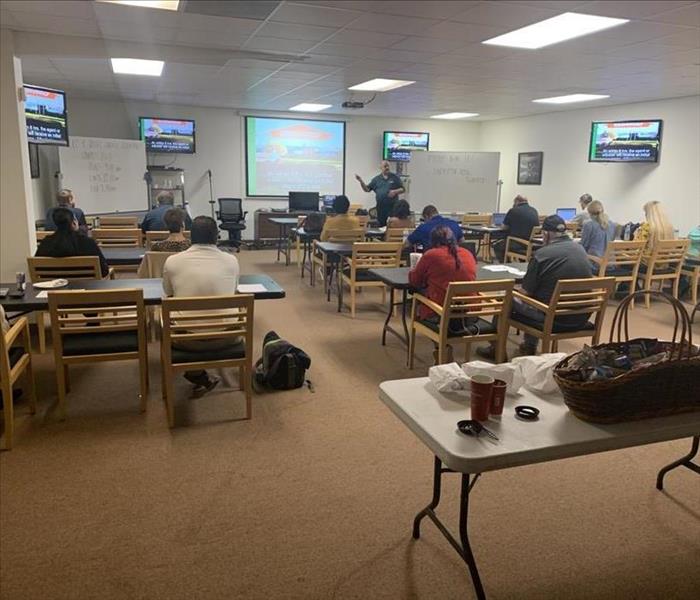 Call SERVPRO of Spring/Tomball at (281) 374-6454
Call SERVPRO of Spring/Tomball at (281) 374-6454
Our first class of 2020! This Continuing Education course covers Fire & Smoke Damage Restoration! In this 4-hour course from 9 am - 1 pm, we discussed the special procedures used by professionals in mitigating and restoring fire damage claims for the insured. The purpose of the course is to provide you, the insurance professional, with a better understanding of the work performed by the mitigation vendor at fire damage work sites. You will learn emergency tips which can drastically reduce the cost of the claim if performed in a timely manner. We will demonstrate examples of work performed to mitigate fire damage. This course will help you better understand what your insured is going through when they have fire damage.
If you are in need of any CE credits, call Samantha or Jack at (281) 374-6454, or email smr@SERVPROspringtomball.com to RSVP or ask for our 2020 schedule! We have classes almost every month of the year!
Visit our website for more information!
If you don't need CE credits, come on out for a tour of our facility! We want you to know what you're working with when you need home water damage mitigation or fire restoration!
Fire Safety Tips for Turkey Day!!!
10/30/2019 (Permalink)
As people look forward to their Thanksgiving feasts, fire safety is rarely their first concern. According to the National Fire Protection Association, Thanksgiving is the peak day for home cooking fires. As you begin plans for turkey and stuffing, be sure to keep these safety tips in mind to help prevent injury and property loss due to fire.
BE PROACTIVE
- Test the batteries in your smoke alarms. Press the test button on your units to make sure they work.
- Prevent fires by making sure your oven and stovetop are clean and free of grease and dust.
BE ATTENTIVE IN THE KITCHEN
In 2015, U.S. fire departments responded to an estimated 1,760 home cooking fires on Thanksgiving. Unattended cooking was by far the leading contributing factor in cooking fires and fire deaths, and cooking equipment was involved in nearly half (48 percent) of all reported home fires.
- Stay in the kitchen when cooking on the stovetop and keep an eye on the food.
- Stay in the home when cooking your turkey as well, and check on it often.
- If you must step away from your cooking, set a kitchen timer so you don’t get distracted by guests.
- Keep children at least three feet away from the stove, oven, hot food and liquids. Steam or splash from vegetables, gravy, or coffee could cause serious burns.
- Keep items that can catch fire away from the cooking area.
- Make sure the floor is clear of tripping hazards.
- Turn pot and pan handles inward and away from the front or edge of the stove.
BE MINDFUL OF OPEN FLAME
According to the U.S. Fire Administration, candles are responsible for an estimated 15,600 residential fires per year, resulting in 150 deaths, 1,270 injuries, and $539 million in property damage.
- Ensure matches and utility lighters are out of the reach of children.
- Never leave children alone in a room with a lit candle.
BE CAUTIOUS DEEP-FRYING YOUR TURKEY
In recent years, it has become trendy to deep-fry turkeys instead of cooking them in the oven. Deep-frying a turkey, which involves submerging an entire bird in hot cooking oil, is so dangerous that the NFPA specifically discourages this cooking technique. A small amount of cooking oil coming into contact with a burner can cause a large fire, and without thermostat controls, deep fryers may also overheat the oil to the point of combustion. In 2015, the U.S. Consumer Product Safety Commission reported that there had been more than 168 turkey-fryer related fire, burn, explosion, or CO poisoning incidents since 2002, causing 672 injuries and $8 million in property damage.
- Never use a deep fryer on a wooden deck, under a patio cover, in a garage, or in an enclosed space.
- Fryers should only be used outdoors on a sturdy, level surface isolated from anything that could burn.
- Keep children and pets out of the 3-foot radius around your fryer to protect against burn injuries.
- The pot, lid, and handles of a turkey fryer can be incredibly hot. To protect hands and arms against burns, wear long, well-insulated cooking gloves.
- Wear safety goggles to protect your eyes from oil splatter.
- Keep an all-purpose fire extinguisher nearby and never use water to extinguish a grease fire.
- Make sure the turkey is completely thawed and thoroughly dried before it is placed in a fryer. The water from a frozen turkey will not mix with the oil in the fryer and can be an explosion hazard. The National Turkey Foundation recommends that you add 24 hours of thaw time in the refrigerator for every five pounds of turkey weight. Thawing in the refrigerator is the safest option, and turkeys should never be defrosted on the countertop.
Fire Damage Restoration Clean Up Tips!!
10/22/2019 (Permalink)
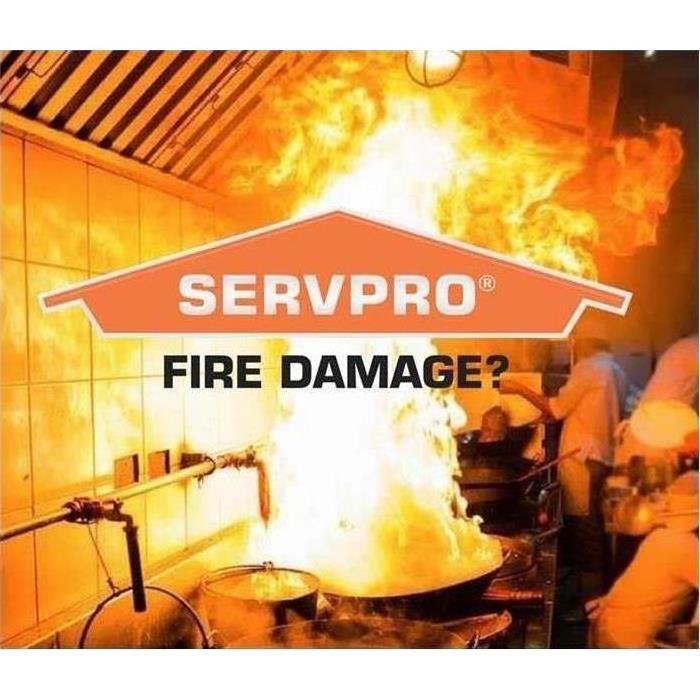 Call us as soon as you experience fire damage. SERVPRO of Spring/Tomball will be out as soon as possible!!
Call us as soon as you experience fire damage. SERVPRO of Spring/Tomball will be out as soon as possible!!
Fire – even in small amounts – can be extremely dangerous even if the after-effects are not immediately visible. There are a few things that need to be known before entering the home after you have had a fire. Fire damage restoration is almost always necessary.
First, consult a fire marshal and ensure that it is safe to re-enter the home after fire damage. Even though you may want to inspect and see what survived the fire, you need to be safe for obvious reasons. Fire can cause the home to be extremely unstable and dangerous.
Immediately following the fire, call SERVPRO of Spring/Tomball to help assess the damage in the home and begin the cleanup process. Our trained and certifies professionals can save a lot of money, time and keep your family safe when dealing with fire damage, but here are some things you can do before we arrive to help speed up the process a bit more.
Remember: DO NOT enter your home without approval from a fire marshal!
Fire Damage Restoration Clean Up Tips:
- Open all windows and doors to ventilate and help get the smoke out as much as possible.
- Cover any clean, unaffected pieces of furniture up with plastic to make sure they are not damaged in the cleanup process.
- Do not try to clean anything yourself. The soot and smoke that has set into the furniture and carpet can be dangerous.
- Don’t plug in any electronics. Call an electrician to inspect for any electrical damage from the fire.
- Throw out any open of possibly exposed foods that make have been contaminated from the fire.
Fire and smoke are very tricky problems to deal with, and should only be taken care of by professionals who are well educated in the field. At SERVPRO of Spring/Tomball, our highly trained fire damage restoration technicians know that areas of the home that may look unaffected by the fire may still possibly be dangerous. We promise to inspect every cavity of your home to make sure every bit of smoke damage is taken care of so you can get back into your home as soon as possible.
Apartment Complex Fire Damage
8/26/2019 (Permalink)
An apartment complex located in Houston, TX experienced a major fire that caused damage to multiple units. SERVPRO of Spring/Tomball was notified of the loss and we sent our trained professionals to assess the job to get the complex back to "Like it never even happened."
If you experience fire damage to your commercial property, give us a call! We will have someone out as soon as possible to do an inspection. After our inspection is complete, we will have a crew out as soon as you want them to start the cleanup and demo process.
To be prepared for instances such as a fire, call us today to set up an Emergency Ready Profile (ERP). An ERP will speed up the inspection process as well as the cleanup process!
Kitchen Fire Safety When Using Grease
8/13/2019 (Permalink)
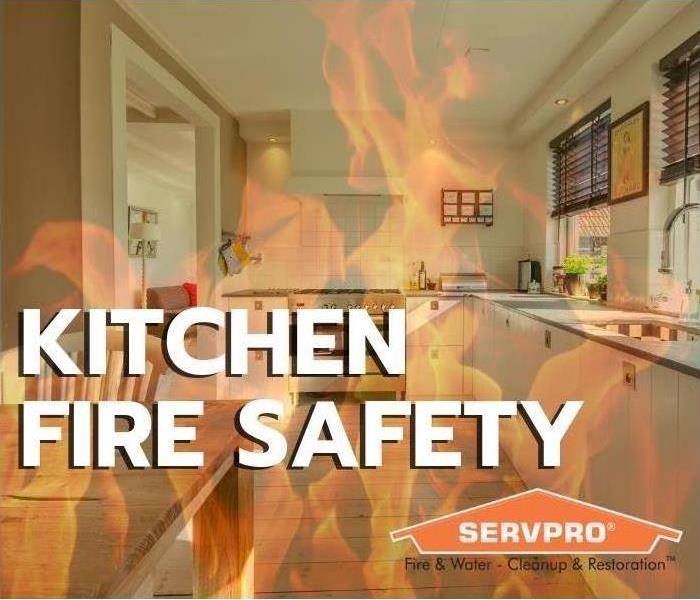
Many of us cook every day without thinking twice about the safety hazards that reside in the kitchen. Grease fires are oftentimes more dangerous than other fires because if they’re not extinguished properly, it is easy for them to spread. Using the wrong material to douse the flame can end in you getting seriously hurt and your home severely damaged.
Here’s everything you need to know about how to stop a grease fire and prevent one from happening.
How to Stop a Grease Fire the Right Way
Let’s say you’re frying your favorite food and suddenly you notice wisps of smoke escaping from the oil you’re using. Before you know it, there are flames leaping up from the pan. What should you do? The key to putting out a grease fire is to suffocate it by cutting off any oxygen flow. Here are a few ways you can do this safely:
1. Turn Off the Heat Source
The very first step is to immediately turn off the burner, thus eliminating a heat source that could make the fire worse. Though this might be second nature, whatever you do, don’t attempt to move the pan or pot to a cool burner. The oil could splash on your or your kitchen, spreading the flames and causing injury.
2. Cover With a Metal Baking Sheet or Lid
As previously mentioned, you should cut the fire off from any oxygen. You can do this by sliding a metal baking sheet or lid over the pan or pot, cutting off the oxygen and allowing the fire to burn itself out. The key material here is metal. You should never use a glass or plastic lid or sheet as the high heat of the fire can cause these materials to melt or shatter. Leave the sheet or lid on long enough to ensure the fire is completely out. When removing it, slowly slide it off to make absolutely sure the flames are gone for good.
3. Pour Salt or Baking Soda on the Flame
Another way to help remove oxygen is by pouring salt or baking soda onto the flame. However, this works best if you have a large amount of either solution within close reach. Never use flour or baking powder on a grease fire, as these two materials are combustible and can amplify the intensity of the fire.
4. Use a Class B Fire Extinguisher
Most people’s first instinct to a kitchen fire is to reach for a fire extinguisher. However, not all fire extinguishers will put out the same types of fires. Grease and oil fires require the use of a class B extinguisher. These extinguishers are designed to fight flammable liquids that include grease or oil. You can also use a multipurpose extinguisher as long as the label includes class B. When using an extinguisher, make sure you aim the extinguisher at the fire from a safe distance. The high pressure from the extinguisher can cause flames to spread if you are too close.
5. As a Last Resort, Call 911 and Evacuate Your Home
If the steps above don’t contain the fire, you should then call 911 or your local fire department and evacuate your home immediately. Grease fires take only a few minutes to take over the kitchen, so the sooner you realize you need 911 assistance, the better. Fortunately, most types of grease fires—especially if caught early—can be stopped by trying the methods listed above.
Why Can’t I Use Water to Put Out a Grease Fire?
The first impulse, when faced with a grease fire, is often to try putting it out with water. However, this can create a very dangerous situation that can cause the flames to spread. Oil and water don’t share the same density, so water can’t be used to put out a grease fire. In fact, water that gets thrown on a grease fire can turn to steam within nanoseconds due to the fire’s high temperature. The oil molecules can actually attach themselves to the water molecules and “hitch a ride”, so to speak. This means the steam can carry the flames to other surfaces, igniting the fire in surrounding areas. This makes the fire and smoke damage restoration process following the fire lengthy and much more costly. We can’t stress this enough: NEVER put water on a grease or oil fire, even if you don’t have anything else available to safely quell the flames. Call for emergency services.
How to Prevent a Grease Fire
As scary as they may be, grease and oil fires can be prevented by following a few safety precautions while cooking:
1. Use an Appropriate Oil For Frying or Cooking
Cooking oils have various smoke points, which is the maximum temperature to which they can be safely heated. You should always strive to use cooking oil with a high smoke point for frying. Know the smoke point of the oil you intend to use and use a cooking thermometer when frying to ensure you stay safely below it.
2. Remove Moisture From Food Before Frying
Any food you intend to fry should be completely defrosted and thoroughly dried off. Never place frozen food into hot oil as the water can splatter and bring hot grease with it.
3. Never Leave the Stove Unattended
47% of kitchen fires are caused by an unattended stove. It only takes a few minutes for a pot or pan to get overheated, so always keep your full attention on your cooking.
4. Keep a Means of Extinguishing the Fire Nearby
Whether it’s a metal cooking sheet, class B fire extinguisher, or a large container of salt, always keep one of these emergency tools within safe reach when cooking with oil or grease.
By following these tips, you’ll ensure a grease fire doesn’t have a chance to start in the first place.
Quick Action Can Stop a Grease Fire
Knowing the correct way of putting out a grease fire can help prevent injury to yourself and your loved ones, as well as preventing serious damage to your home.
Call SERVPRO of Spring/Tomball today at (281)374-6454 for your fire restoration needs. We are always here to help!!
Fire Safety For Independence Day!!
7/2/2019 (Permalink)
Summer is here and SERVPRO of Spring/Tomball is here to prepare you with fire safety tips for your commercial or residential property.
Independence Day is just around the corner and between the barbecues, fireworks, and bonfires during the heat of the year, we want to make sure that our community is safe from fire damage.
July is one of the peak months for grilling fires. Enjoy grilling your favorite meals this summer while also keeping your family safe.
- Check gas grill hoses for cracks, holes, and leaks.
- Keep children away from grills. Gas leaks, blocked tubes, and propane tanks can be a cause of grill fires and explosions.
- Never grill indoors, in the garage, in an enclosed area or on a surface that might catch fire.
- Keep the grill at least two feet away from decks, siding, branches and any outdoor equipment that can catch fire quickly.
If you experience fir damage, you can call us 24/7/365 at (281)374-6454
SERVPRO Is Here To Help You!!
5/24/2019 (Permalink)
Experiencing a fire in your home or business can be an overwhelming and traumatic experience. It can be difficult to know who to call and what steps to take to mitigate the damage while coping with your loss. At SERVPRO of Spring/Tomball, we are here to help. Our experienced and compassionate team will be your guide throughout the restoration process and will work directly with your insurance company to ensure your property is restored as quickly as possible. Our crew teams will be out immediately after you make the phone call. We have teams on call 24/7/365.
We are a full-service operation and are certified, licensed, and prepared to perform fire and smoke damage cleanup and repairs. Fire damage restoration is extremely complex, and often requires emergency board-up or tarping, contents pack-out, smoke cleanup, and even water cleanup. At SERVPRO of Spring/Tomball, we are equipped to handle all of these complexities with ease, simplifying the entire process for our customers. Give us a call at (281) 374-6454
Do You Struggle With Bad Odor In Your Home?
5/14/2019 (Permalink)
As experts in deodorization, SERVPRO of Spring/Tomball is trained to identify and eliminate offensive odors. These odors can come from a number of sources both inside and outside a structure, including fire damage!
SERVPRO teaches IICRC technical classes in the proper removal of odors. Masking and other shortcuts don't work when your odor problem is serious or persistent.
We have the training and equipment to identify and eliminate these offensive odors. By identifying the cause of the odor, and determining the conditions where it contacts surfaces, the odor can often be removed over time without a trace. Our technicians have access to several odor removal products capable of penetrating surfaces to neutralize an unpleasant odor thoroughly.
The science of identifying and eliminating odors can be a tricky thing, so give us a call at (281) 374-6454, and leave the restoration to us.
Why are Fire Alarms Important?
4/17/2019 (Permalink)
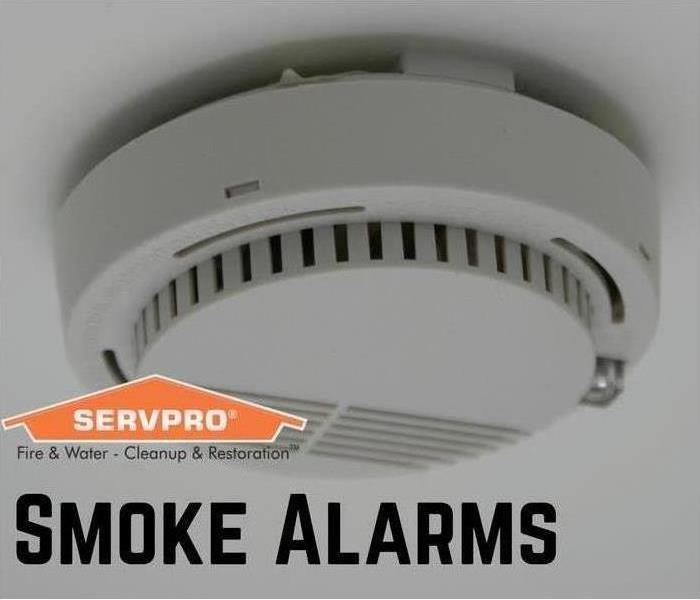 Smoke alarms are very important!
Smoke alarms are very important!
According to the National Fire Protection Agency (NFPA), three of every five home fire deaths results from fires in homes with no smoke alarms (38%) or no working smoke alarms (21%). A majority of fatal fires happen when families are asleep because occupants are unaware of the fire until there is not adequate time to escape. A smoke alarm stands guard around the clock, and when it first senses smoke, it sounds a shrill alarm. All in all, smoke alarms are crucial elements in the early detection of fires. If you have not checked your smoke alarm in years or several months check out these statistics from the NFPA.
Click this link The Smoke Alarm Effect
If you acquire fire or smoke damage, don't hesitate to call SERVPRO Spring/Tomball at (281) 374-6454. We are always here to help!
SERVPRO Is Here For You!
3/1/2019 (Permalink)
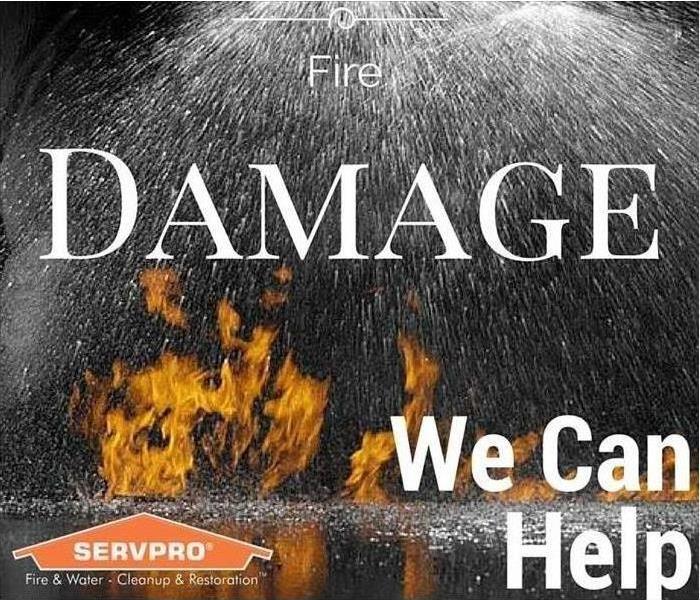 SERVPRO of Spring and Tomball will there immediately to assist you in any way we can!
SERVPRO of Spring and Tomball will there immediately to assist you in any way we can!
SERVPRO of Spring/Tomball professionals know just how devastating a fire can be. Fire and water damage can leave your house unsafe and unlivable. Our crew members are trained to clean and restore your home with as little disruption as possible and as fast as possible.
Step1: Emergency Contact
Step 2: Inspection and Fire Damage Assessment
Step 3: Immediate Board-Up and Roof Tarp Service (if needed)
Step 4: Water Removal and Drying (if water damage is present)
Step 5: Removal of Smoke and Soot from All Surfaces
Step 6: Cleaning and Repair
Step 7: Restoration
Call SERVPRO of Spring/Tomball at (281) 374-6454 to make your home or business look "Like it never even happened". We are here to assist you 24/7, 365 days a year!
Smoke and Soot
1/23/2019 (Permalink)
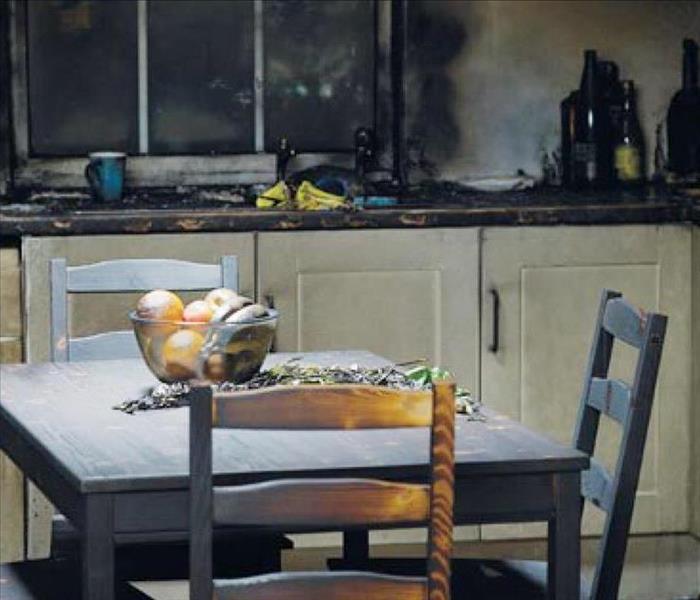 Smoke and Soot Damage Can Cause a Pervasive Odor in Your Home.
Smoke and Soot Damage Can Cause a Pervasive Odor in Your Home.
Smoke and soot is very invasive and can penetrate various cavities within your home, causing hidden damage and odor. Our smoke damage expertise and experience allows us to inspect and accurately assess the extent of the damage to develop a comprehensive plan of action.
Smoke and soot facts:
- Hot smoke migrates to cooler areas and upper levels of a structure.
- Smoke flows around plumbing systems, seeping through the holes used by pipes to go from floor to floor.
- The type of smoke may greatly affect the restoration process.
Different Types of Smoke
There are two different types of smoke–wet and dry. As a result, there are different types of soot residue after a fire. Before restoration begins, SERVPRO of Spring/Tomball will test the soot to determine which type of smoke damage occurred. The cleaning procedures will then be based on the information identified during pretesting.
Here is some additional information:
Wet Smoke – Plastic and Rubber
- Low heat, smoldering, pungent odor, sticky, smeary. Smoke webs are more difficult to clean.
Dry Smoke – Paper and Wood
- Fast burning, high temperatures, heat rises, therefore, smoke rises.
Protein Fire Residue – Produced by evaporation of material rather than from a fire
- Virtually invisible, discolors paints and varnishes, extreme pungent odor.
Since each smoke and fire damage situation is a little different, each one requires a unique solution tailored to the specific conditions. We have the equipment, expertise, and experience to restore your fire and smoke damage. We will also treat your family with empathy and respect and your property with care.
Have Questions about Fire, Smoke, or Soot Damage?
Call Us Today – SERVPRO of Spring/Tomball at (281)374-6454
Thanksgiving Cooking Safety Tips!
10/16/2018 (Permalink)
Thanksgiving is the leading day for home cooking fires but with preparation and common sense, many home cooking fires can be avoided.
- Do not leave stoves, ovens, and ranges unattended—stay in the kitchen so you can keep your eyes on the food.
- Make sure to keep children away from the stove as the steam or splash from the food on the stove can cause serious burns.
- Roll up your sleeves or wear short sleeves while cooking so your clothes do not start on fire.
- Keep pot holders and food wrappers away from heat sources while cooking.
- After your guests leave, be sure all cooking appliances are off and all candles are blown out.
- Call 9-1-1 immediately if an oven fire occurs!
- Fry outdoors, away from buildings and other combustible items. Never use a fryer indoors. Keep children and pets away while frying.
- Follow instructions on what size turkey should be used, how it should be cooked and what type of oil to use.
Follow these simple steps in keeping safety in your kitchen during the holidays!
From our team here at SERVPRO of Spring/Tomball, we wish you all a Merry Christmas, Happy Holiday and a very Happy New Year!
Pet Fire Safety
8/24/2018 (Permalink)
We want to help you protect your pets from potential danger.
- The best way to protect your pets from the effects of a fire is to include them in your family plan. This includes having their own disaster supplies kit as well as arranging in advance for a safe place for them to stay if you need to leave your home.
- When you practice your escape plan, practice taking your pets with you. Train them to come to you when you call.
- In the event of a disaster, if you must evacuate, the most important thing you can do to protect your pets is to evacuate them, too. But remember: never delay escape or endanger yourself or family to rescue a family pet.
- Keep pets near entrances when you are away from home. Keep collars on pets and leashes close by in case firefighters need to rescue your pet. When leaving pets home alone, keep them in areas or rooms near entrances where firefighters can easily find them.
The 4th of July!!
6/29/2018 (Permalink)
The 4th of July is right around the corner which means FIREWORKS! Please keep these tip in mind when you're popping Fireworks!
Firework Safety Tips
- Follow the directions on all fireworks and don't use them for anything other than what they're intended for.
- Don't attempt to alter or combine fireworks products.
- Never use homemade fireworks.
- Report illegal explosives to the nearest fire or police department.
- When lighting fireworks, always have water handy. A hose is best, but a bucket will suffice.
- Spectators should remain a safe distance from the fireworks being lit.
- Whoever lights the fireworks must be sober, wear safety glasses, and keep clothing well away from the flame when lighting.
- Only light fireworks outdoors on a smooth, flat surface, away from all flammable materials including dry leaves and paper.
- Never try to relight fireworks that appear to be duds. Wait up to 20 minutes for a possible delayed ignition. Then if nothing happens, soak the firework in a bucket of water and dispose of it.
- Dispose of all firework materials by first soaking them in water before putting them in the trash.
- Keep sparklers away from clothing and other flammable materials.
We hope everyone has a fun and SAFE 4th of July!!
Fire Hazards!
5/9/2018 (Permalink)
Below are the most common Fire Hazards in your home.
It's a fact that many house fires are caused by someone attempting to cook or smoke while under the influence of alcohol.
Candle fires happen in places like bedrooms and bathrooms where people use them as mood enhancers. Unfortunately, people can fall asleep with a candle still burning or leave the room without snuffing out the flame. Candles should NEVER be left burning unattended!
Many items in the kitchen can catch fire easily including pot holders, dish towels, and product packaging. Keep curtains away from the stove and clean up all spills on the stove top or near by counters.
Unsafe use of electricity can be a ticking time bomb! An electrical fire can happen at any time. Follow-up when a fuse or circuit breaker blows. Don't just reset the breaker or replace the fuse. Find out what caused the problem.
Too many fires are caused from careless disposal of smoking materials
Preventing Commercial Kitchen Fires
5/7/2018 (Permalink)
While commercial kitchens are a fast, convenient way to prepare food, they can also present significant fire hazards if not properly maintained.
With so many flammable ingredients in one concentrated area, you will want to take all safety precautions available to prevent a kitchen fire. Once your building has been outfitted with the proper fire protection equipment, don’t forget to schedule your regular fire alarm tests and fire extinguisher refills.
Keep It Clean
The majority of kitchen fires begin when flammable cooking material or byproducts, such as oil and grease, are ignited. Not only does grease build up on cooking surfaces, it can also collect bits of food and paper, increasing flammability.
- Train your staff. Even with the best preventative equipment, fires can happen and it’s important that the kitchen crew has the training to know what to do in an emergency. Have meetings and drills about fire prevention, evacuation of patrons, and how to use extinguishers. Make sure new hires are brought up to speed.
Fire in your home....
4/17/2018 (Permalink)
Do you know what to do if there is a fire in your house?
4 Tips if there is a fire in your home!
1. Decide if you should fight the fire or flee.
Don't attempt to extinguish any fire if there is a threat to your safety. If the fire is small and you know how to use a fire extinguisher, you can attempt to extinguish the fire. You must note that fires can increase in size and intensity in seconds, blocking the exit path can create a dangerous atmosphere.
2. The main priority is to get you and your family members out safely.
Your priority should be to get yourself and your family members out as quickly as possible. Please don't think of picking up your valuables. Timing is very important.
3. If you see smoke, crawl to the nearest exit!
The toxic gases and the super heated air in the smoke makes it more dangerous. Smoke is lighter than air and so it rises above air.
4. If your clothes catch on fire, remember to STOP, DROP, and ROLL!!!
If clothes catch fire, they can spread quickly engulfing the victim in flames.
How to Prevent House Fires
4/9/2018 (Permalink)
Listed below are four common causes for a house fire and how to avoid it!
Faulty Wiring and Outlets Are One of the Top Causes of House Fires!
- Check the electrical cords throughout your home for signs of fraying, and replace all frayed wires.
- Do not pinch or cover electrical cords with items such as rugs.
- Be aware of the capacity of your home's electrical system. Do not overload your circuits.
Carelessness in the Kitchen May Also Lead to a House Fire!
- Never leave your pots or pans unattended on the stove.
- Keep a kitchen fire extinguisher readily available and make sure you know how to use it.
- Keep your stove and oven clean. Built up food splatter or grease can later ignite when the stove or oven is turned on.
Clothes Dryers Are Another Common Source of House Fires.
- Clean out the dryer vent regularly.
- Clean out the lint filter after each load.
- Lint may also collect under and behind your dryer, make to clean these areas regularly.
Alternative Heating Sources can Also Create a Fire Hazard
- Avoid using an older space heater, as it may not have adequate safety features compared to newer units.
- Do not place a space heater near furniture, curtains or other objects that could easily catch fire.
8 Cooking Safety Tips for the Holidays
1/2/2018 (Permalink)
 SERVPRO® of Spring/Tomball Please Call 281-374-6454
SERVPRO® of Spring/Tomball Please Call 281-374-6454
During the holidays, everybody enjoys a nice meal with their families. Baking a ham, green bean casserole, dressing, and cranberry sauce--YUMM!
When cooking these meals, be sure to be cautious of oven and stove top safety.
1.) Keep spills cleaned up on and around your stove top.
2.) Keep and eye on your pans in the oven. Always set a timer.
3.) Keep a fire extinguisher close by.
5.) Be sure your smoke detector has good batteries in place.
6.) DO NOT throw water on a grease fire.
7.) Keep your body safe guarded at all times by wearing proper safety gloves or mitts.
8.) Keep children and pets away from ovens and stove-tops in use.
Follow these simple steps in keeping safety in your kitchen during the holidays!
From our team here at SERVPRO of Spring/Tomball, we wish you all a Merry Christmas, Happy Holiday and a very Happy New Year!
THE TREE'S ON FIRE!!!!!
12/19/2017 (Permalink)
 SERVPRO® of Spring/Tomball Please Call 281-374-6454
SERVPRO® of Spring/Tomball Please Call 281-374-6454
You go out with your family and pick out the BIGGEST, MOST BEAUTIFUL Christmas Tree that you all have ever seen. You take it home and decorate it as a family. That tree looks AMAZING!!!!! Every day that you walk through your living room, you admire what a beautiful tree you have.
Well wouldn't you prefer to keep that tree and your home safe?? I don't know about you, but all of the time and effort and love I would have for that Christmas Tree could be wasted effort if you don't keep it nice and hydrated.
Keep in mind that Christmas Trees cause over $17.5 million in property damages each year.
So remember, keep your Christmas trees hydrated and your holidays happy!
From our team here at SERVPRO of Spring/Tomball, we wish you all a Merry Christmas, Happy Holiday and a very Happy New Year!
https://www.facebook.com/SERVPRO.springtomball/
Beware of Candle Flames
11/7/2017 (Permalink)
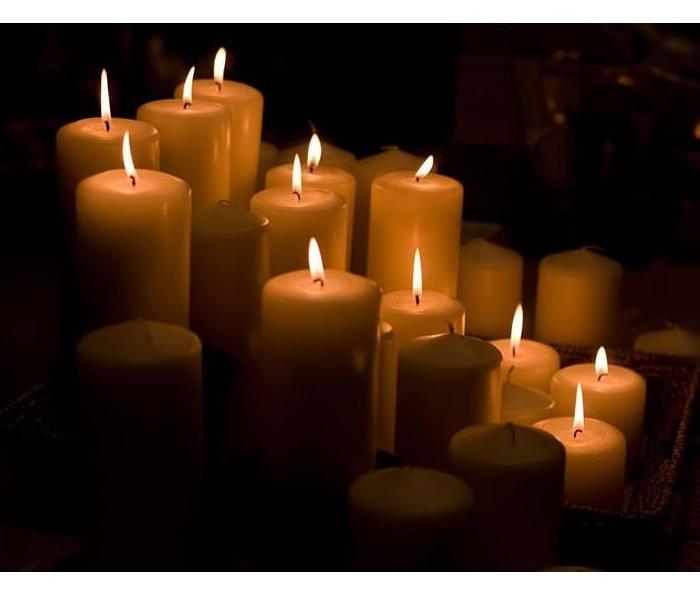 SERVPRO® of Spring/Tomball Please Call 281-374-6454
SERVPRO® of Spring/Tomball Please Call 281-374-6454
Candles may be pretty to look at but they are a cause of home fires and home fire deaths. According to the National Candle Association, 70% of households in the United States use candles. Most people don’t see candles as a major fire hazard, but according to the National Fire Protection Association (NFPA) from 1983-1998 candles accounted for 8,690 fires, 104 deaths, 974 injuries and an estimated $126 million in property damage. Between 2001-2002 an estimated 18,000 fires were started by candles with 130 deaths, 1350 injuries and $333 million in property damage.
DON’T GET BURNED! FOLLOW THESE SAFETY TIPS!
- Use candles only with constant adult supervision
- Never leave a candle burning!
- Keep candles away from items that can catch fire, such as Christmas trees, clothing, paper or curtains
- Place candles and candleholders on a secure piece of furniture. Make sure candleholders are non-combustible and large enough to collect the dripping wax.
- Do not place candles in windows where blinds or curtains can close over them
- Keep wicks trimmed to 1/4 inch and extinguish candles when they burn to within 2 inches of the holder
- Keep candles and all open flames away from flammable liquids
Do not use candles in places where they can be knocked over by children or pets- Always have a working smoke alarm!
FREE CE CREDIT COURSE-Cleaning and Restoring Smoke Damaged Contents
7/5/2017 (Permalink)
TO ALL WHO ARE IN NEED OF CREDITS TOWARD THEIR CONTINUING EDUCATION:
SERVPRO Spring/Tomball will be hosting a 2 hr. Class on July 20th, 2017. The class will be on Cleaning and Restoring Smoke Damaged Contents.
This course is specifically designed to explain the different approaches and techniques to scoping, cleaning, and restoring smoke-damaged contents. The purpose is to provide you with a better understanding of the work performed by the mitigation vendor at smoke-damaged work sites.
Restoring a customers contents is a pretty big goal for SERVPRO. We have an amazing contents and mitigation crew that are determined to get things back to the way they were.
Classroom Credit= 2 hours
Light Drinks and Snacks will be provided during class time.
TIME: 9am-11am
DATE: 7/20/2017
FOR RESERVATIONS:
Please call 281-374-6454 or Email Us at: jack.goodroe@SERVPROspringtomball.com OR smr@SERVPROspringtomball.com
Safety Tips When Using Heating Equipment
12/1/2016 (Permalink)
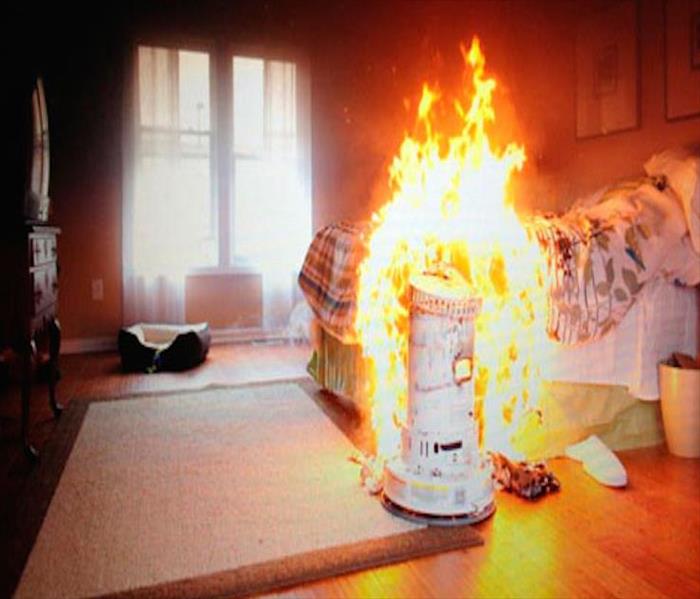 SERVPRO® of Spring/Tomball Please Call 281-374-6454
SERVPRO® of Spring/Tomball Please Call 281-374-6454
Heating equipment is a leading cause of home fire deaths. Half of home heating equipment fires are reported during the months of December, January, and February. Some simple steps can prevent most heating-related fires from happening are below:
- Keep anything that can burn at least three feet away from heating equipment, like the furnace, fireplace, wood stove, or portable space heater.
- Have a three-foot “kid-free zone” around open fires and space heaters.
- Never use your oven to heat your home.
- Remember to turn portable heaters off when leaving the room or going to bed.
- Always use the right kind of fuel, specified by the manufacturer, for fuel burning space heaters.
- Make sure the fireplace has a sturdy screen to stop sparks from flying into the room. Ashes should be cool before putting them in a metal container. Keep the container a safe distance away from your home.
12 Tips to Prevent Workplace Fires
10/20/2016 (Permalink)
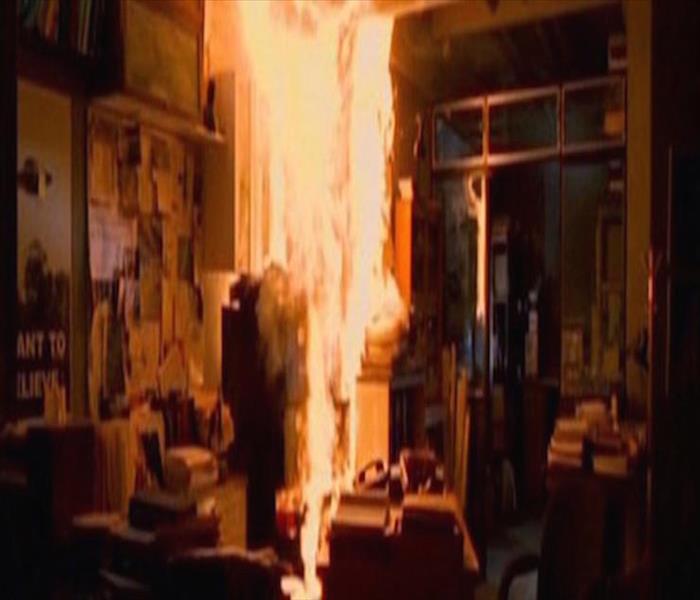 SERVPRO® of Spring/Tomball Please Call 281-374-6454
SERVPRO® of Spring/Tomball Please Call 281-374-6454
October is National Fire Safety Month and while the main focus is on preventing residential fires, it is also a good time to revisit workplace fire safety and prevention. Below are 12 tips to ensure a fire-safe workplace:
Step 1. Get Organized– Practice good workplace housekeeping. Clutter contributes to fires by providing fuel and by preventing access to exits and emergency equipment.
Step 2. Designated Smoking Areas – Smoke only in designated areas, and extinguish smoking materials safely. Never smoke in storerooms or chemical storage areas.
Step 3. Fire Extinguishers – Maintaining the appropriate type and number of fire extinguishers and learn how to properly use a fire extinguisher.
Step 4. Electrical Hazards – Report all electrical hazards. Many fires start in faulty wiring and malfunctioning electrical equipment.
Step 5. Access to Control Panels – Electrical control panels need to have free access maintained so that the electric could be shut off easily.
Step 6. Maintenance – Maintain machinery to prevent overheating and friction sparks.
Step 7. Sprinkler Systems & Smoke Detectors – Never block sprinklers, firefighting equipment or emergency exits. Observe clearances when stacking materials. Testing of sprinkler systems and smoke detectors at least annually.
Step 8. Chemical Safety – Use and store chemicals safely. Read the label and the Material Safety Data Sheet to determine flammability and other fire hazards. Provide adequate ventilation when using and storing these substances.
Step 9. Waste Control & Storage – Control the accumulations of flammable and combustible waste materials and residues so that they do not contribute to a fire emergency.
Step 10. Prevent Ignition – Use all precautions to prevent ignition in potentially explosive atmospheres such as those containing flammable liquid vapors or fine particles. Use non-sparking tools, and control static electricity as required.
Step 11. Exits – Emergency exit diagrams should be posted and emergency exits should be well lit with neon-regulation signs.
Step 12. Contact Info – Employees should have a list of emergency contact phone numbers in case of emergency. Remember that people will often panic in an intense situation; therefore basics such as the company address, phone number and floor plan should be posted.
How Important Are Smoke Alarms?
10/6/2016 (Permalink)
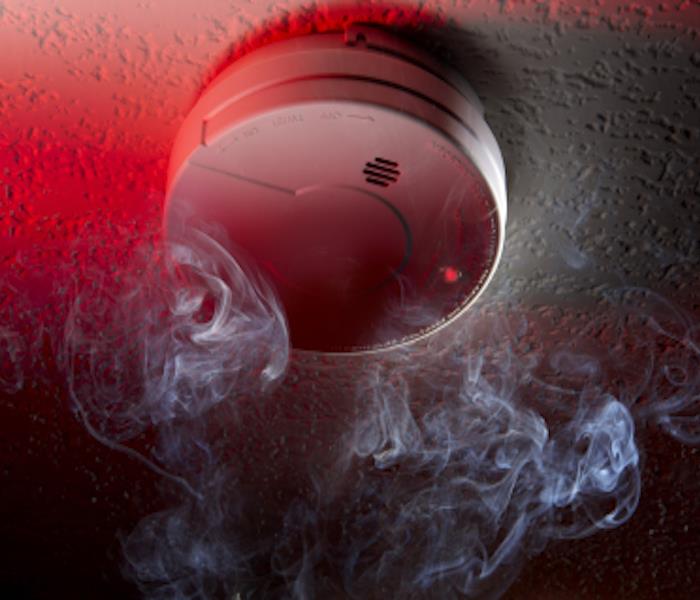 SERVPRO® of Spring/Tomball Please Call 281-374-6454
SERVPRO® of Spring/Tomball Please Call 281-374-6454
According to the National Fire Protection Agency (NFPA), three of every five home fire deaths results from fires in homes with no smoke alarms (38%) or no working smoke alarms (21%). A majority of fatal fires happen when families are asleep because occupants are unaware of the fire until there is not adequate time to escape. A smoke alarm stands guard around the clock, and when it first senses smoke, it sounds a shrill alarm. All in all, smoke alarms are crucial elements in the early detection of fires. If you have not checked your smoke alarm in years or several months check out these statistics from the NFPA.
Click this link The Smoke Alarm Effect
What is Soot?
9/19/2016 (Permalink)
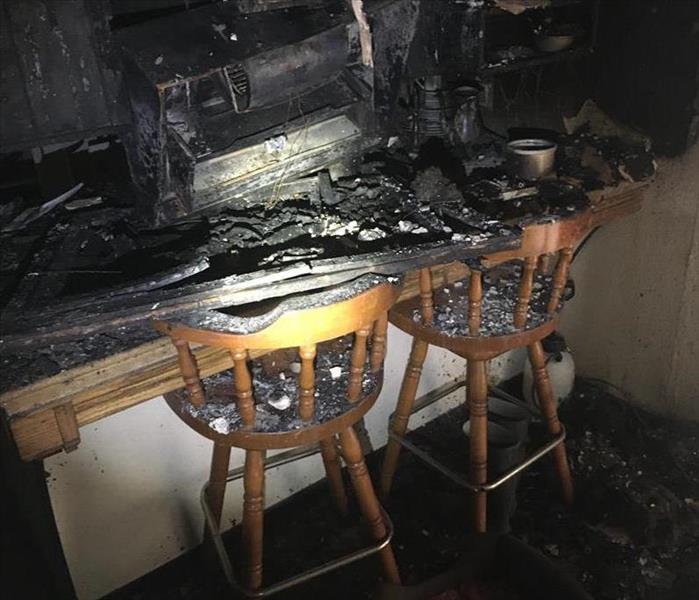 SERVPRO® of Spring/Tomball Please Call 281-374-6454
SERVPRO® of Spring/Tomball Please Call 281-374-6454
Dealing with the aftermath of a house fire can be extremely stressful especially when soot has covered all of your belongings. It should be known that soot restoration is one of the most difficult aspects of a house fire. By the same token, soot can develop through three different methods:
- Wet soot residue—results from smoldering, low-heat fires. This residue is sticky, smeary, and has a very pungent odor.
- Dry soot residue—results from fast-burning fires with high temperatures. This residue is typically dry, powdery, and non-smeary.
- Protein residue—almost invisible but can discolor paints and varnishes in your home. This residue also has an extremely pungent odor.
Because each type of soot is different and requires specific expertise to clean it off your items effectively, it is best to call SERVPRO® of Spring/Tomball for such needs or concerns. It is our duty to serve our customers and help make it “Like it never even happened.”






 24/7 Emergency Service
24/7 Emergency Service











